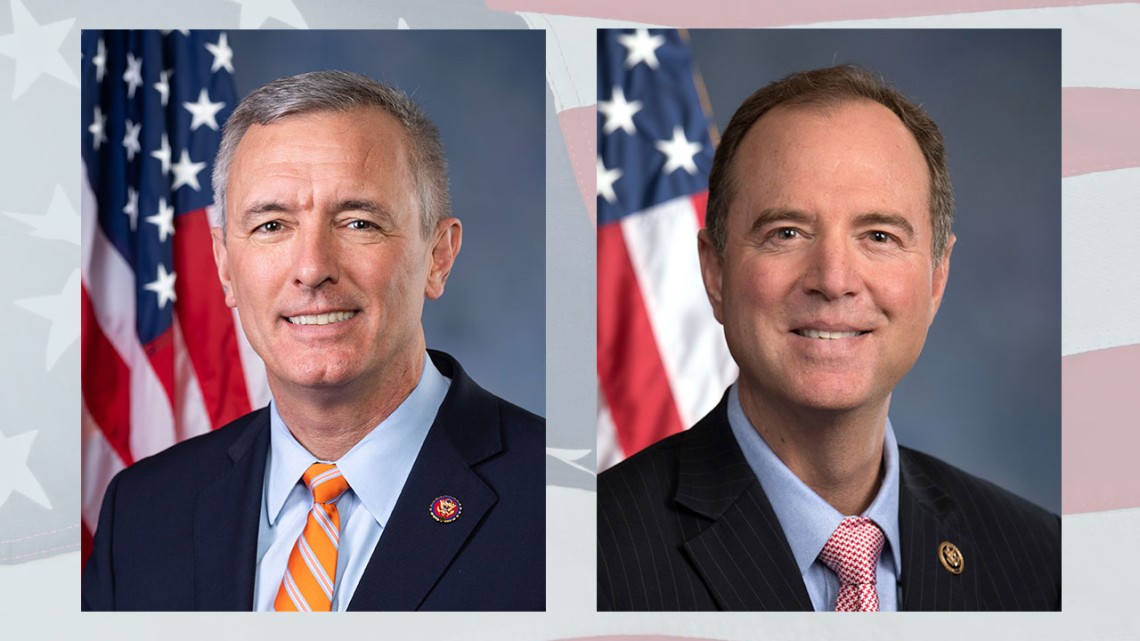
John Katko, a Republican, and Adam Schiff, a Democrat, will headline the State of Democracy Summit, organized by the Institute of Politics and Global Affairs at the Cornell Jeb E. Brooks School of Public Policy. Katko and Schiff will discuss bipartisan solutions to voting rights and election management issues.
News directly from Cornell's colleges and centers
Summit on democracy features high-level insight, surprising survey results
By Jim Hanchett
The Institute of Politics and Global Affairs (IOPGA) at the Cornell Jeb E. Brooks School of Public Policy will bring together an array of prominent experts, including two members of Congress, to discuss the impact of technology-driven misinformation on American democracy.
The day-long conference in New York City on May 24 – The State of Democracy Summit – will also feature the first release of the results from an IOPGA national survey of voters. The responses revealed potential common ground for bipartisan solutions to threats to democracy.
“Repairing and strengthening our democracy will not be easy because Americans are so polarized about such fundamentals as voting rights and the management of elections,” said IOPGA director Steve Israel. “At The State of Democracy Summit, we will learn from influential and creative thinkers who can pinpoint areas of potential agreement. Every election does not have to end in a protest.”
Two members of Congress, a Republican and a Democrat, headline the conference:
- Rep. John Katko (R-New York) was first elected in 2014 and represents four central New York counties. Katko is a former prosecutor and serves on the Homeland Security and Transportation and Infrastructure committees.
- Rep. Adam Schiff (D-California) is serving his tenth term in the House. He also was a prosecutor before seeking elected office. He co-founded the Congressional Caucus for Freedom of the Press and serves as the Chair of the House Permanent Select Committee on Intelligence.
Other speakers come from a range of backgrounds and include Barton Gellman, a Pulitzer Prize winning former correspondent for the Washington Post and currently a staff writer at The Atlantic; Anna Greenberg, a senior partner in the polling research firm GQR; Karen Kornbluh, former U.S. Ambassador to the Organization for Economic Cooperation and Development and now leader of the German Marshall Fund of the U.S. Digital Innovation and Democracy Initiative; Douglas Kriner, faculty director of IOPGA and the Clinton Rossiter Professor in American Institutions in the Department of Government at Cornell as well as a member of the Brooks faculty; Jacquelyn Mason, director of programs at media Democracy Fund; Mor Naaman, a professor at the Jacobs Technion-Cornell Institute at Cornell Tech; Erin King Sweeney, associate senior director at IOPGA and former Republican Majority Leader of the Hampstead, NY Town Council; Colin Woodard, a historian, author and journalist; and Mark Zuckerman, president of the Century Foundation and a former domestic policy advisor in the Obama White House.
Israel, a former member of the U.S. House, will join Schiff on a panel. The event will be opened with remarks by Colleen Barry, founding dean of the Brooks School.
In conjunction with the Summit, Kriner and Israel will announce the results of a unique survey that combined a general population national sample with two representative samples from swing congressional districts. The goal is to find out whether the national political divide is reflected in the handful of battleground districts that determine which party holds power in Washington.
“Many results mirrored what we would expect, and many issues, even surrounding core threats to democracy, were intensely polarized,” Kriner said. “We did, however, find important points of broader consensus. Wide swaths of Americans expressed concern about and backed efforts to ensure the integrity of elections.”
Kriner said the results revealed two surprises. Republicans, nationally and in the swing districts, supported increased federal oversights of elections in states with a history of discrimination against minorities. Democrats approved of reforms to strengthen the right to free speech and protect against the “canceling” of journalists and university faculty who hold unpopular views.
Members of both parties want fair elections and equitable voting rights, Kriner said. The challenge is to identify policies that both parties can adopt that will lead to those outcomes. The State of Democracy Summit is a step in that positive direction.
More information on the Summit including how to watch a livestream of the program is available here.
Media Contact
Get Cornell news delivered right to your inbox.
Subscribe
